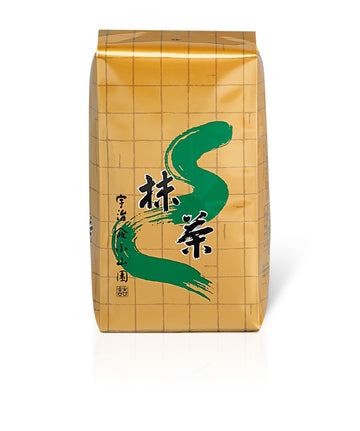Sikibu-No-Mukashi
-
Express tracked delivery:Oct 21 - Oct 25
-
Free Shipping & Returns: On all orders over
CHF 500 ($650/£470)
Sikibu-No-Mukashi
Usucha (thin tea) grade Uji matcha.
Origin: Kyoto Prefecture, Japan
Shikibu no Mukashi represents an exceptional choice for connoisseurs seeking a remarkably flavorful and distinct usucha tea. This matcha is notably full-bodied, exhibiting an intensely creamy and sweet profile, complemented by subtle toasted seed notes in its flavour and aroma. Its creamy, umami-rich finish gracefully lingers on the palate, embodying a refined and soft character rather than bold or overtly distinctive flavours. Consistent with the qualities of subsequent teas in this collection, Shikibu no Mukashi enhances and amplifies the delicate and sophisticated nuances inherent in the tea. Its superior quality also permits preparation as a thick tea (koicha), underscoring its versatility and premium status.
The term "Shikibu no Mukashi" (式部の昔) holds significant cultural and historical meaning. "Shikibu" originally referred to the Ministry of Ceremonies, which oversaw personnel and ceremonial affairs in historical Japan. Additionally, "Shikibu" was used as a title for ladies-in-waiting, exemplified by renowned figures such as Murasaki Shikibu and Izumi Shikibu from the Heian Era.
Regarding the general usage of the terms "mukashi" and "shiro," these expressions appended to tea names carry grading implications, distinguishing between thick and thin teas, respectively. Historically, "Mukashi" was likely the original term employed, with "Shiro" emerging in later periods.
The word "Mukashi" is believed to derive from a combination of Chinese characters representing "twenty" (廿) and "day" (日). Importantly, March 20th (廿日) on the lunar calendar was traditionally regarded as the optimal day for harvesting the finest tea leaves.
The term "Shiro" gained prominence during the reign of the third shogun, Tokugawa Iemitsu. It is said to have originated when feudal lords commissioned Uji tea masters to produce tea that was “thin” or “light.” Although the precise meaning of “shiro” at that time remains unclear, it is generally understood to denote variations in taste preferences. Historical records indicate that Furuta Oribe favored dark green tea, whereas Kobori Enshu preferred a lighter variety. This distinction between “dark” and “light” teas may also reflect differences in tea preparation methods practiced in Uji.
While alternative theories exist regarding the origins of the terms “mukashi” and “shiro,” there is reasonable consensus that “mukashi” has been in use since ancient times, with “shiro” becoming widespread from the Edo period onward. Subsequent generations of tea masters replaced the traditional term “mukashi” with “shiro,” both of which had been used to denote tea grades, thereby standardizing the terminology.
Although the precise impact of historical shifts in the tea ceremony on the meanings of “shiro” and “mukashi” remains somewhat ambiguous, these terms undeniably reflect evolving cultural trends and have been preserved into contemporary usage. Their continued relevance underscores the dynamic history and enduring legacy of Uji matcha within the broader context of Japanese tea culture.
“All items are sold in their original packaging from the manufacturer. Sealed and unopened.”



